The healthcare sector is currently undergoing unprecedented development, and the medical billing process has become increasingly complicated. The increasing pressure on healthcare providers is to simplify their revenue cycle management in compliance with the constantly evolving regulations. This is where the best medical billing software applications are relevant, and provide a complete package to automate the billing and lessen errors, and increase cash flow.
The choice of the most appropriate billing software is very important to both large and small practices in the current competitive healthcare environment. Regardless of the size of your healthcare organization, “a proper healthcare billing software can simplify your business, minimize administration overhead, and make the revenue cycle faster. The extensive list of the leading medical billing software of 2025 has been reviewed in this guide, with advice that allows you to make a well-informed choice that matches your needs and the budget of your practice.
What is Medical Billing Software?
Medical billing software is a dedicated digital product that helps to streamline the complicated process of healthcare revenue cycle management by automating it. They are highly advanced systems that touch on the registration of patients, insurance checks to claims, and payment. In its most minimal form, billing software is the financial backbone of medical practices, as it provides the healthcare professional with the appropriate compensation as promptly as possible.
Contemporary medical billing applications are way beyond fundamental invoicing features. They are built into different healthcare systems such as electronic health records (EHR), practice management software, and clearinghouses, and form a smooth workflow that can reduce the human factor in work and minimize the probability of errors. Such systems automatically record patient encounter information, code it using suitable medical codes (CPT, ICD-10, HCPCS), validate insurance eligibility, and e-mail claims to insurance payers.
Benefits of Using Medical Billing Software
Automated billing procedures also help in the faster filing and collection of claims and are used to collect revenue faster and better working capital.
- Enhanced Accuracy and Compliance: The integrated validation control and coding features minimize mistakes made during the billing process, not to mention that they fulfill the demands of both healthcare and payment organizations.
- Streamlined Administrative Operations: Automated routine billing releases the staff time to patient care activities and other value-added administration activities.
- Better Financial Visibility: A plethora of reporting and analytics is available to get an understanding of the practice performance and make decisions based on the information to enhance profitability and effectiveness.
- Reduced Administrative Costs: The fact that the processes are paperless and that the data is also provided manually helps to reduce the costs of the operations and the general productivity of the practice, in general.
List of the Top 10 Medical Billing Software
1. Kareo
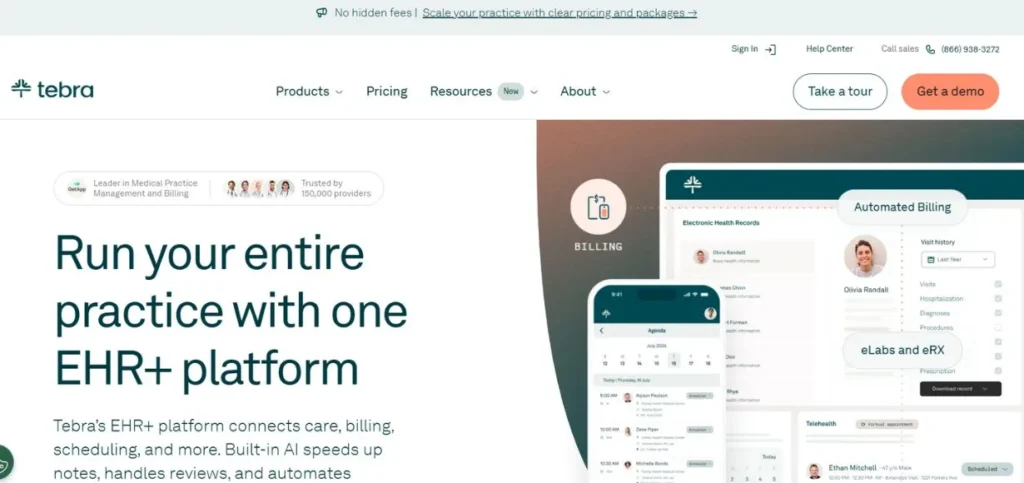
Kareo is one of the most popular billing software solutions offered to small to medium-sized healthcare practices. This is a cloud-based solution integrating billing, practice management, and electronic health records into a full-fledged solution responding to the special needs of independent practices. The simplicity of the interface also allows Kareo to be used in practices that do not have a lot of technical expertise, and the rich feature set makes it capable of meaningful professional-grade billing. Kareo can be integrated with other third-party apps, such as EHR, patient engagement, and accounting software, which enables the seamless ability to connect with them.
Key Features:
- Cloud-based accessibility
- Practice management, integrated.
- Computerized claims.
Pros:
- User-friendly interface ideal for small practices
- Affordable pricing with a transparent fee structure
- Excellent customer support and training resources
Cons:
- Limited customization options for larger practices
- There are more advanced reporting features at a fee.
- Occasional system slowdowns during peak usage periods
Pricing: Contact for pricing
Website: http://kareo.com
2. AdvancedMD
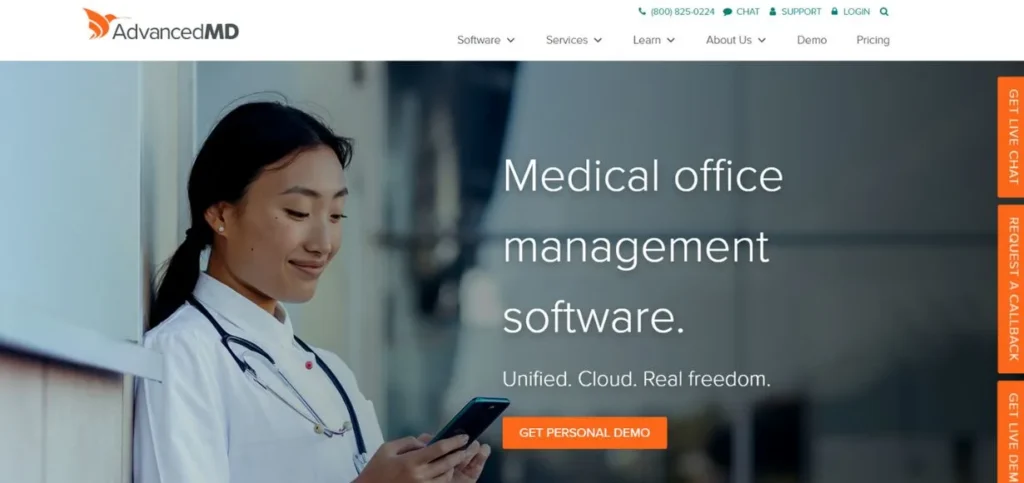
AdvancedMD is a full-scale medical billing software solution that is designed to serve small or large practices, including single-provider clinics and big healthcare facilities. The platform is characterized by the richness of the feature set, which features powerful analytics, workflow customization, and a high level of integration. As part of an advanced hospital management software ecosystem, AdvancedMD helps hospitals streamline billing, optimize administrative workflows, and improve patient care coordination. The strength of AdvancedMD is that it can grow in tandem with the increasing practices without losing its performance and reliability. A powerful reporting engine in the software allows a deep insight into the practice performance, and, therefore, healthcare administrators can make decisions that are informed by data to promote both clinical and financial performance.
Key Features:
- Advanced analytics dashboard
- Mobile application support
- Customizable workflow automation
Pros:
- Very scalable in an enlarging practice.
- Comprehensive reporting and analytics capabilities
- Strong integration with multiple EHR systems
Cons:
- Higher learning curve for new users.
- More expensive than simple billing solutions.
- Installation may be time proportional.
Pricing: Contact for pricing.
Website: http://advancedmd.com
Suggested Blog: Best AI Tools for Finance
3. athenaCollector
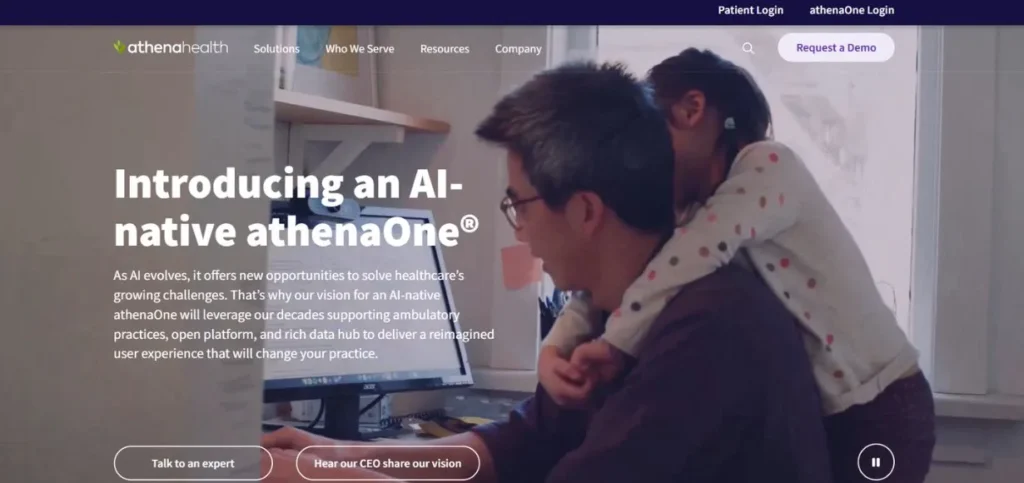
AthenaCollector, the athenahealth suite, is an advanced revenue cycle management system employing artificial intelligence and machine learning to enhance the performance of billing. This is a cloud-based platform that is famous due to the pricing model that is based on performance and ensures better collection rates, thus it is appealing to many practices that work on optimizing their revenue cycle. Combined with the rest of the athenahealth ecosystem, athenaCollector provides seamless workflows in clinical documentation, practice management, and billing.
Key Features:
- AI-powered claim optimization
- Performance-based pricing model
- Billing experts.
Pros:
- Assured increase in collection rates.
- Minimal setup and maintenance requirements
- The service is provided with expert billing support.
Cons:
- Higher cost for smaller practices
- Less control over billing processes
- Requires commitment to the athenahealth ecosystem
Pricing: Contact For Pricing
Website: http://athenahealth.com
4. NextGen Healthcare
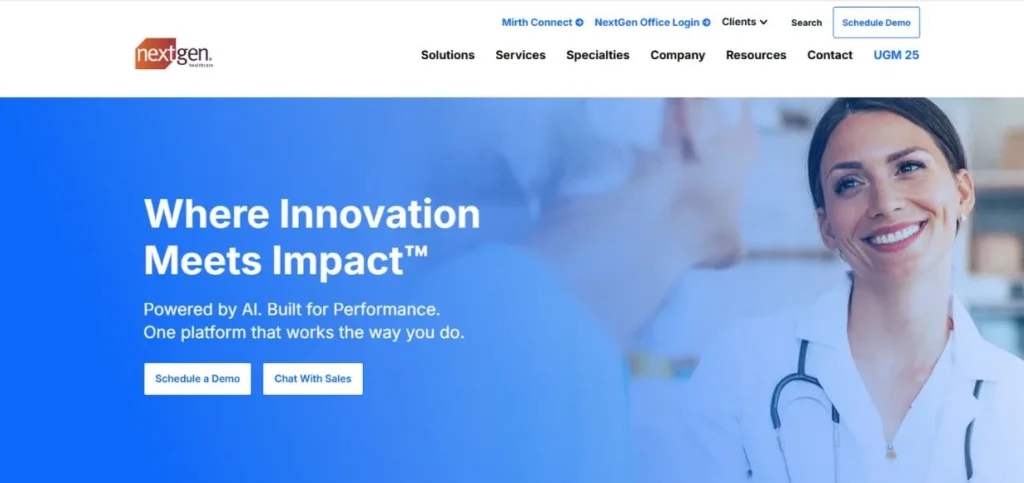
NextGen Healthcare is a medical billing software solution that is part of an integrated healthcare technology platform that has the potential to support practices of all sizes and specialties. The long history of the company in the healthcare technology sector has developed a well-established and fully developed platform that can support more complex billing requirements without introducing additional complexity in user requirements to simpler business operations. NextGen Healthcare interoperability is ensured to ensures a smooth information-sharing process with other healthcare management systems, laboratories, imaging centers, and other care providers.
Key Features:
- Specialty-specific templates
- Interoperability standards compliance
- Comprehensive revenue analytics
Pros:
- Strong specialty-focused features
- Robust reporting and analytics capabilities
- Excellent interoperability with other systems
Cons:
- It can be too overwhelming for smaller practices.
- Higher implementation costs
- Requires significant training investment
Pricing: Custom pricing
Website: http://nextgen.com
5. DrChrono
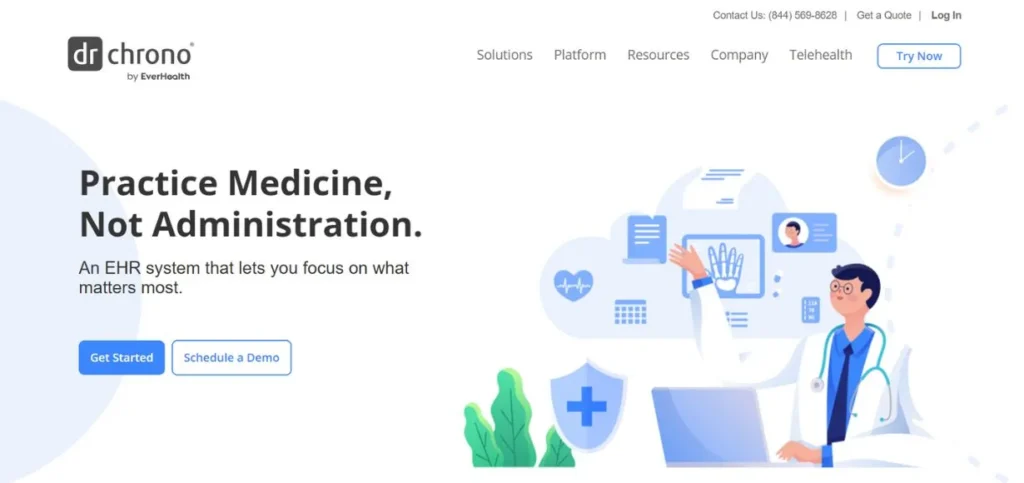
DrChrono is a unique solution to the medical software industry by providing an actual integrated platform, which incorporates electronic health records, practice management, and billing features into one unified solution. This iPad-based platform was developed ground up with the support of mobile delivery of healthcare, with support of powerful billing operations that satisfy the requirements of contemporary practices. The strength of the platform is its simplicity of use and sleek interface design that is appealing to both technology-oriented healthcare professionals and younger practice members.
Key Features:
- iPad-native interface
- Functioning EHR.
- API-first architecture
Pros:
- Modern, intuitive user interface
- Strong mobile capabilities
- Extensive customization options
Cons:
- Limited desktop functionality
- Newer company with smaller market presence
- Certain traits may be technical.
Pricing: Contact for pricing
Website: http://drchrono.com
6. CureMD
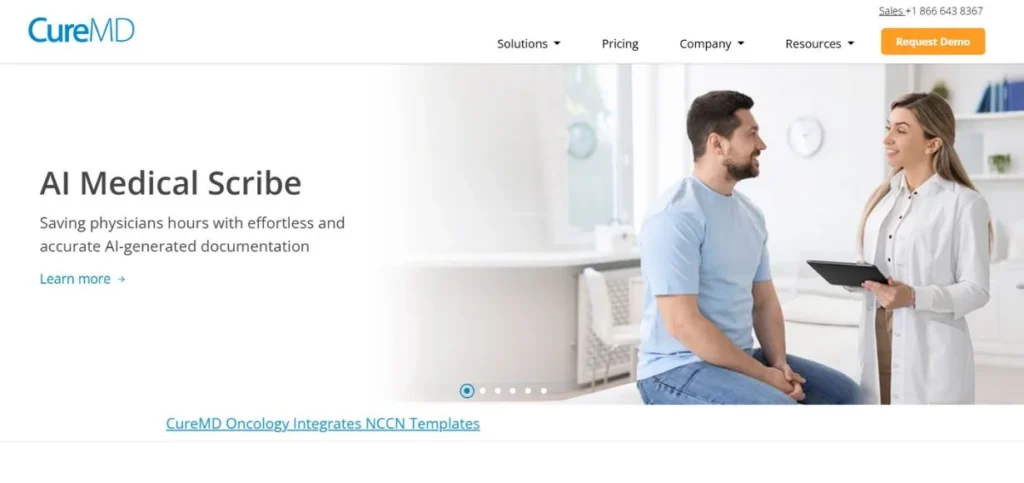
CureMD is a billing software company that provides an easy-to-use solution without losing sophisticated functionality. The cloud-based platform has established a solid reputation for offering quality billing services paired with high-quality customer care, hence being highly appealing to practices that are moving off paper-based or legacy billing systems. The balance between the advanced functions and the simplicity of the design is the strength of the platform, which allows the practices to introduce advanced billing procedures without having to undergo lengthy technical training.
Key Features:
- User-friendly interface
- Comprehensive onboarding
- Regulatory compliance automation
Pros:
- Easy to learn and implement
- Excellent customer support
- Strong compliance features
Cons:
- Little sophisticated customization.
- Fewer specialty-specific features
- Compared to enterprise solutions, basic reporting.
Pricing: Call for Pricing
Website: https://www.curemd.com/
7. CareCloud
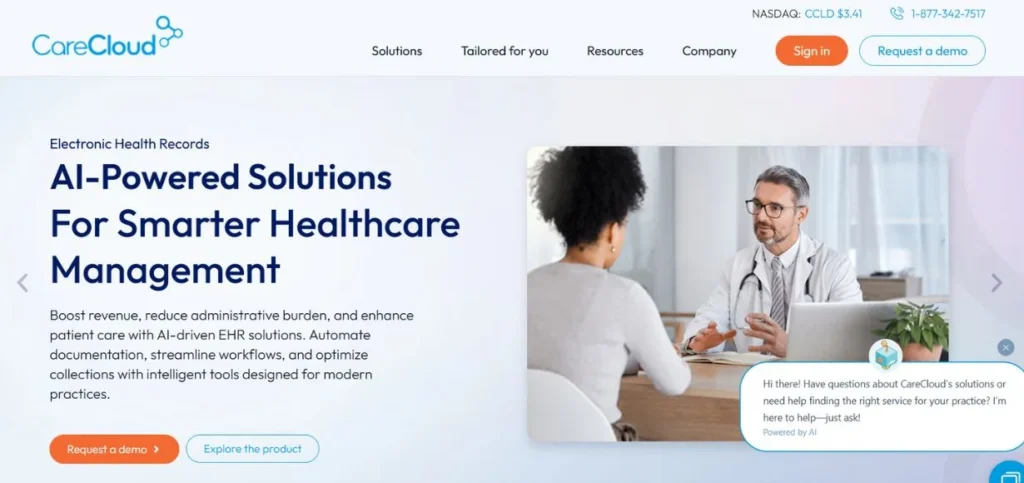
CareCloud provides the latest medical billing software application that utilizes cloud computing to provide scalable and efficient medical billing services to both large and small healthcare practices. The focus on automation and artificial intelligence on the platform enables practices to minimise manual billing and enhance precision and collection rates. CareCloud offers both software and managed billing services, which are offered as a full package to give flexibility to practices whose resources need to be diverse.
Key Features:
- AI-powered automation
- Managed services option
- Comprehensive integration ecosystem
Pros:
- Well-developed automation functionality minimizes human effort.
- Software only or managed services are available on a flexible basis.
- Modern, cloud-based architecture
Cons:
- Higher cost for full-service options
- Newer platform with a changing set of features.
- May needs a time of adaptation to classic procedures.
Pricing: Custom pricing
Website: http://carecloud.com
8. PracticeSuite
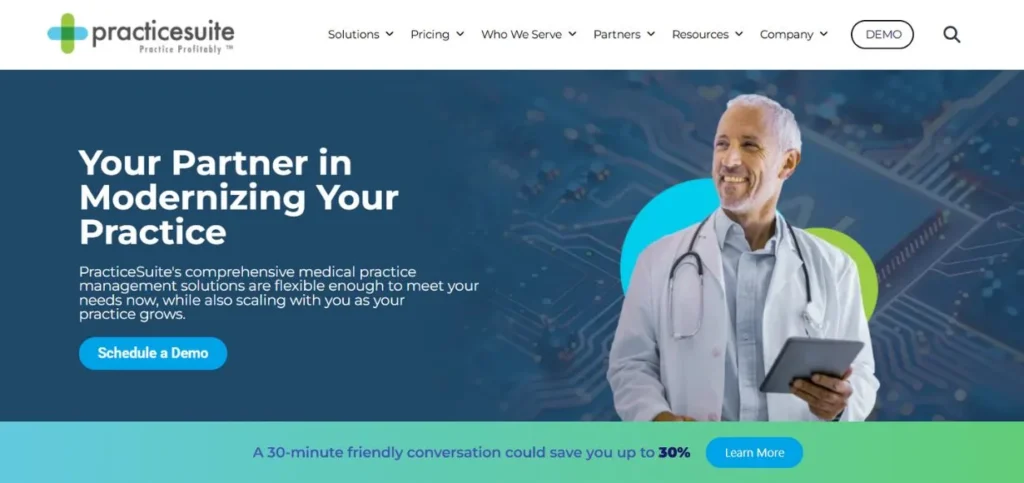
PracticeSuite is a fully integrated billing software platform that integrates practice management, electronic health records, and billing into one affordable platform, specifically tailored to suit small to medium-sized practices. Its emphasis on offering extensive functionality at a price that is affordable to independent practices and small healthcare groups to modernize their operations without investing heavily in capital has made the company popular.
Key Features:
- All-in-one platform
- Affordable pricing structure
- Training and support were included.
Pros:
- Comprehensive features at a competitive price
- Easy implementation and training
- No additional fees for standard features
Cons:
- Limited scalability for large practices
- Lack of sophisticated capabilities relative to enterprise solutions.
- Basic customization options
Pricing: Call for Pricing
Website: http://practicesuite.com
9. NueMD
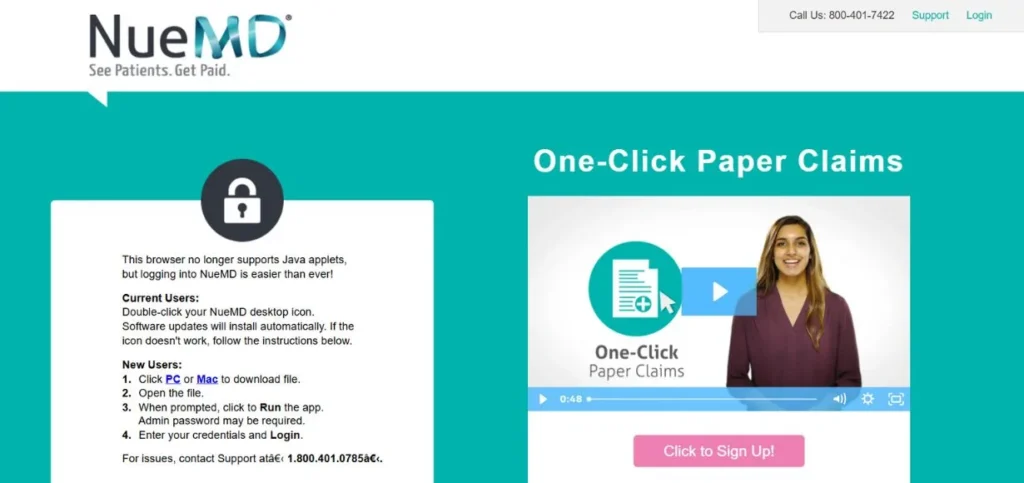
NueMD is a medical billing software solution that targets simplicity and reliability in small to medium-sized healthcare practices with a cloud-based solution. The platform has established a good reputation for offering consistent performance and simple functionality as opposed to complexities linked to enterprise-level billing systems. The focus on basic billing capabilities in NueMD is the guarantee that the practices will be able to effectively manage their revenue cycle without any unwarranted complications.
Key Features:
- Reliable claim
- Denial management
- Transparent pricing
Pros:
- Consistent performance
- Straightforward functionality
- Good value for money
Cons:
- Limited advanced features
- Basic reporting capabilities
- Fewer integration options
Pricing: Contact for pricing
Website: https://login.nuemd.com/
10. CollaborateMD
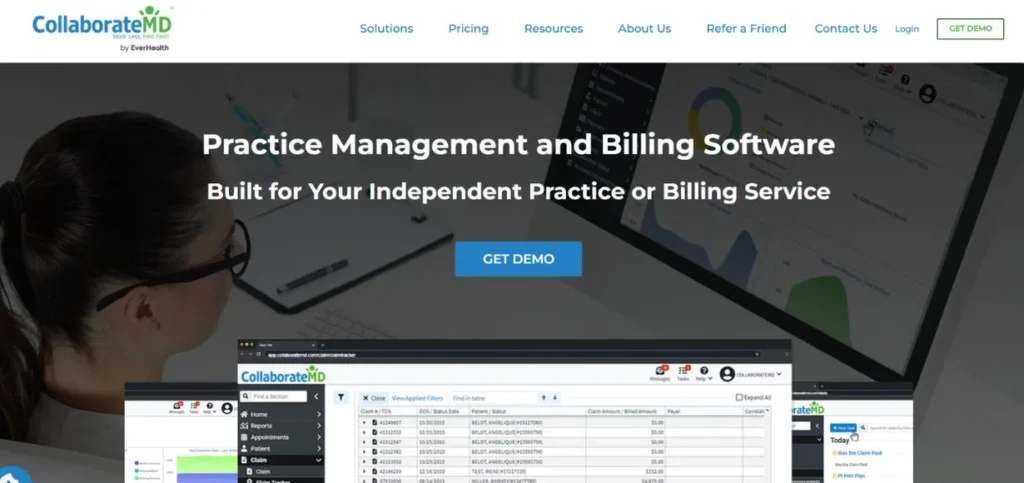
CollaborateMD is a web-based billing software solution that can be used by small-scale medical practices up to large healthcare institutions. The collaborative and communication tools of the platform assist practices in organizing billing operations among different users and sites and ensuring accuracy and efficiency. The flexible architecture of CollaborateMD allows all types of practice structures and billing patterns.
Key Features:
- Collaborative workflow management
- Flexible user permissions
- Scalable architecture
Pros:
- Strong collaboration features
- Flexible configuration options
- Scalability of growing practices.
Cons:
- The interface can become old-fashioned regarding other, more modern platforms.
- Poor mobile capability.
- Requires more setup time for optimal configuration
Pricing: Custom pricing
Website: http://collaboratemd.com
How to Choose the Right Medical Billing Software for Your Practice
- Practice Size and Growth Plans: Evaluate solutions that are capable of managing your large number of patients initially and expand with forecasts of long-term growth and expansion initiatives.
- Specialty-Specific Requirements: Inquire about the software, whether it uses templates, coding sets, and workflows that meet the specialty in medicine billing requirements.
- Integration Capabilities: Make sure the billing solution is able to interoperate with your current EHR software and practice management software, among other beneficial healthcare applications.
- Budget and Total Cost of Ownership: Determine the actual cost, not by the calculation of the subscription costs, but also implementation costs, training costs, and maintenance costs.
- User Experience and Training Requirements: Check how user-friendly the software is and whether or not your employees can be trained to use the new system without necessarily spending a long time in training.
Conclusion
The medical billing software you have chosen to implement in your practice should be carefully chosen with consideration of your needs, your financial aspect, a nd your future expansion interests. No matter how big or small your practice is (small family practice or large healthcare organization), the right healthcare billing software can impact your bottom line and business performance significantly. The medical billing solutions mentioned in this extensive guide are a different combination of product features, pricing plans, and service levels to meet the different needs of the practice. The medical billing software market can present options to each healthcare provider today, in the spectrum of simple, low-cost solutions to small practices and sophisticated enterprise-level solutions.
Investment in quality billing software will be a long-term investment that will impact the financial well-being of your practice. Allow yourself some time to fully evaluate the alternatives, insist on demonstrations by different vendors, and involve the major stakeholders in the decision-making process. With proper healthcare billing software, your practice will be able to thrive in a more complex healthcare environment and deliver high-quality patient care, not to mention remaining financially viable.
Frequently Asked Questions
1. Which is the best medical billing software for small practices?
In small practices, Kareo and PracticeSuite are usually the most affordable and easiest to use, as well as the ones that have the necessary features. These platforms also come with detailed billing features without the complexity or cost of enterprise-level solutions, which is why they are best suited to practices that have limited IT resources and budgets.
2. What is the cost of medical billing software?
Medical billing software is expensive, depending on features, size of practice, and level of service. Ultimate solutions begin at approximately 69-80 per provider per month, whereas sophisticated platforms may be as much as 200 and above per provider per month. Others have percentage-based pricing models, where they charge 2-8 percent of the revenue they collect as opposed to charging monthly fees.
3. Can medical billing software integrate with EHR?
Yes, the vast majority of modern medical software systems can integrate with popular EHRs. Through these integrations, redundant data entry is eradicated, proper billing data is present, and a smooth workflow between clinical record and billing processes is created. It is always important to confirm certain integration compatibility prior to a purchase decision.
4. Does medical billing software on the cloud have any security?
Cloud-based medical software can be very safe provided the providers take the right security precautions, which include encryption, access controls, and routine security audits. The majority of reputable vendors meet the HIPAA and industry security standards and, in most cases, offer superior security to on-premises systems that are operated by individual practices.
5. Which is superior, in-house billing or outsourced billing software?
This is subject to your resources, expertise, and control preferences in practice. On-site billing using special software offers more control and can possibly be cheaper in the long term, but it takes staff training and management. Billing is outsourced, administrative load is reduced, but the cost is increased, and less direct control over billing is maintained.

